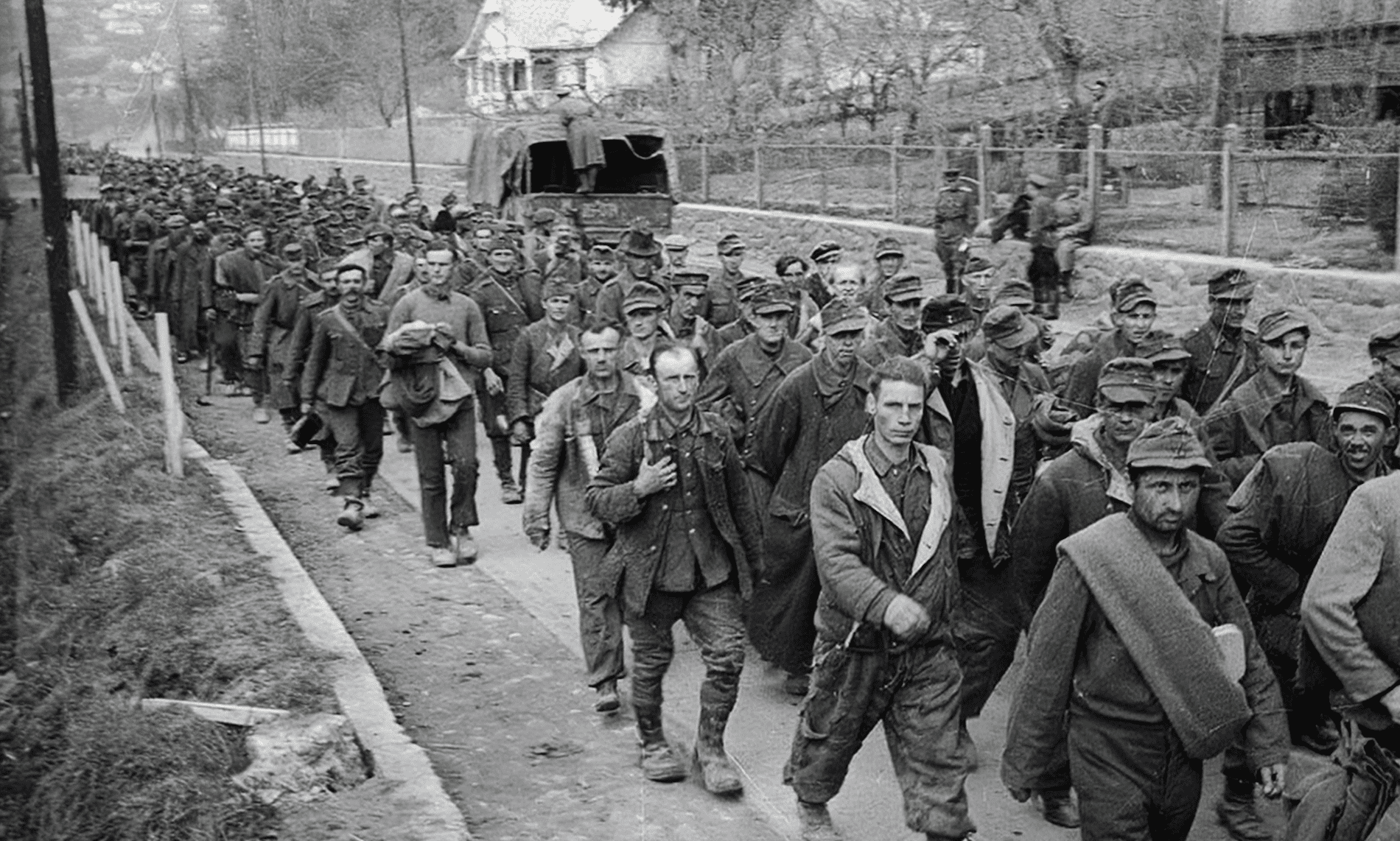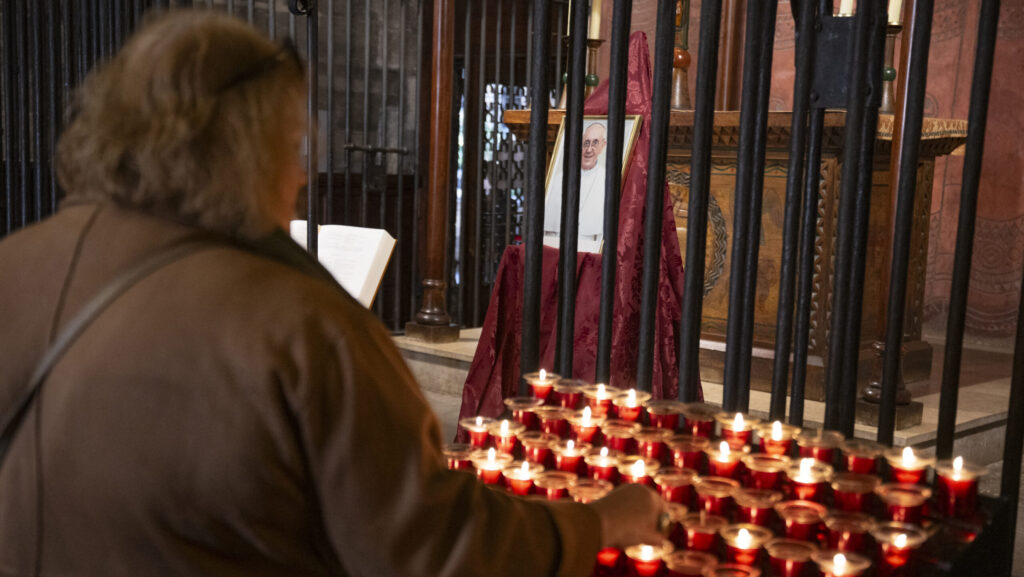Until the regime change in 1989, it was not allowed to talk about the horrors suffered by Hungarians taken as POWs (prisoners of war) by the Soviet army, or about the Malenkiy robot (little work meaning forced labour) and the Gulag, because this would have tarnished the Soviet-Hungarian friendship, which was officially ‘unbreakable’. For many decades, the fate, suffering and death of countless Hungarians deported to the East was shrouded in silence; those who returned home were threatened; the perpetrators continued to live out their days in peace; no authentic information was produced on the circumstances of the imprisonment of the innocent civilians, nor on the lives and suffering of the victims.
On the other hand, there was also the story of the Hungarian POWs taken to Western states—the socialist propaganda did not fail to impress upon the public consciousness that the Hungarian prisoners were subjected to unspeakable horrors in the imperialist French, British and American camps, and that the virtuous socialist government is fighting for their release and repatriation. Among the Hungarian troops or Arrow Cross men imprisoned were many civilians, people who had not done any military service at all. ‘This mass was not, of course, homogeneous in its political history, its ideas, its feelings, its convictions. They were not all, in the least, people of the Arrow Cross government,’ wrote the historian Béla Vincellér.1
There was a kernel of truth in socialist propaganda when it talked about the Arrow Cross marching unknowing Hungarians to the West. In a series of interviews published in the literary magazine Alföld, a former prisoner of war said that although he had been in military training, he was never taught how to fire a gun. Still others had apparently been randomly rounded up by the Arrow Cross—in many cases young people aged 15–16, under the threat of being beheaded. ‘We saw placards saying “opposition will be met with capital punishment” everywhere,’ recalled another ex-POW.2
During the final part of the war, the Hungarian Army units fighting in the West made special efforts to be captured by the Allied forces, to avoid being taken prisoner by the Soviets. ‘We had to flee, because those who couldn’t, would be captured in the East,’ recalled one refugee.3 France, having taken few prisoners of war, turned to the Allies and asked for two million POWs to help rebuild the country, of which it received one million. The treatment of the prisoners of war under their authority was so terrible that within a few months, one in seven died.
The reality on the ground was very different
Although the 1929 Geneva Convention on the Treatment of Prisoners of War prohibited any form of threat to the life or health of prisoners of war, intimidation or reprisals against them,4 the reality on the ground was very different. The captive state was responsible for the transportation of prisoners of war, providing them with decent housing, food, medical attention, contact with the outside world and repatriation after the end of hostilities.5 During and after WWII, some 8,000 POW camps were established in Europe, few of which complied with the Geneva Convention. Of the one million who were taken prisoner by France, 50,000 were Hungarian. For more than six months, no Red Cross representatives were allowed into the French POW camps, to hide the unspeakable conditions. This is how a former Hungarian prisoner in France, Ferenc Hollai, recalled his days in the POW camp:
‘We had no direct contact with the French guards. They guarded us like a bad shepherd guarding his flock. They took great care to keep the prisoners all in one place, but neither food nor medical care was provided. One thing they did do was make us line up from time to time, strip to the waist and then they checked if any of us had our blood type tattooed under our left arm. Everyone in the German SS had a tattoo, so it was easy to find out who was an SS. And they were kept in a separate cage, much more strictly guarded. The supply of American rations (…) was soon completely abolished. Occasionally, we would be given a sack of rotten potatoes. A hundred people one sack. Ten of us were given a single loaf of bread, the cutting up and equitable distribution of which always involved quarrels and fights. Every little crumb was of great value. I could feel my condition deteriorate day by day. I had to conserve my energy, so I tried to move as little as possible, just lying around all day. When I stood up, I felt dizzy all the time. Again, water was brought to the camp by tanker trucks carrying petrol. We could hardly drink the extremely foul-smelling liquid.’6
In many places, until prisoners signed up to join the French Foreign Legion, they were simply not given food, so they had to choose between starvation and the Foreign Legion. ‘The French did not inform us of what was going on in the outside world,’ wrote Ferenc Hollai. ‘We had no idea that a civil war had broken out in the Far East, in Vietnam, against the colonial French army. We only became aware that one day the recruiters of the Foreign Legion appeared among us and tried to persuade us to enlist in the Legion with all sorts of promises. The most tempting was the food. Of course, there was talk of lots of money and that you could see the world, not rot there in this cruel prison camp. A lot of people signed up.’7 But the French recruiting officers were primarily looking for well-trained German soldiers, not ragged Hungarians.8
In addition to the starvations, the horrors of the Second World War also haunted Hungarian prisoners in the West. One prisoner recalled that they had to take baths in rooms where Jews had previously been murdered in a former concentration camp.9
There is an almost universal consensus that at the end of World War II, Western prison camps were ‘sanatoriums’ compared to Soviet captivity, as conditions in the former were relatively humane. Memoirists spoke highly of the American officers who gave them chocolate, chewing gum, and cigarettes.10 But this was not the case in the prison camps that the Americans set up across the Rhine and later handed over to the French.12 The fate of the prisoners there changed radically from one day to the next. According to Károly Ferenczy, a bald man who had fallen from American captivity into French hands, as soon as the French took over, ‘they pulled two of us out (of the line) and started beating us, swearing, and only then did they check our armpits…Only after having found no SS tattoo did they ask why we were bald.’13
‘We were treated like human beings, no one was insulted. The good life did not last long’
Károly Varga compared the American and French camps in a similar way: ‘[In the American camps] we could cut our hair, shave, take a bath, get clean clothes, cigarettes, white bread with butter, and in the evening coffee with milk. We were treated like human beings, no one was insulted. The good life did not last long. We were put in wagons and taken to France. What a difference!’14 Emil Galántai of Budapest described the French captivity simply as ‘misery’.15Thousands died of starvation as a result of the extremely scarce food supply and poor nutrition. Young POWs, who had been taken in droves from Hungary by the Germans, were the prime targets of French cruelty because of their weakness. According to a former Hungarian POW,
’The most deprived ones in the camp were the young conscripts. The children, dressed in German air force uniforms, stood all day long near the fence of the camp’s outermost corral, where the German peasants were harvesting the crops and taking them to the village in wagons for threshing. The children would weep and beg for a handful of grain to be thrown over the fence. When one boy threw out his waist belt, they threw him a bundle in return. The boys happily plucked the seeds from it, roasted them and ate them contentedly. Then all those dry seeds made them very thirsty, so they drank a lot of water. The dry seeds and the large amounts of water took its toll. One after another they became bloated and lay on the ground, wailing with an excruciating stomach ache. These children had not had a bowel movement for weeks. The food blocked normal bowel function. Hideous howls broke the night’s silence and we had to watch helplessly as these unfortunate, innocent victims were torn apart alive and died. All night long, for hours, the terrible screaming, the wailing, the crying. But, of course, we were not given food after that either.’19
In another incident, in exchange for his wedding ring, a young Hungarian boy was let outside the camp by French guards to pick potatoes. However, while the boy was outside, a change of guard took place, and the bribed guard did not tell his comrade about the deal. The young boy was fatally shot on his return and his Hungarian companions could hear his screams all night. ‘Then, at dawn, silence,’ wrote Ferenc Hollai.20
The inhuman conditions in the French prison camps were also outrageous for the Hungarians because it was a well-known fact that during the war, many French had escaped from the prison camps in Germany to Hungary. These people were not only treated humanely in Hungary but were also treated as civilian internees (since Hungary was not at war with the French at that point), and Hungary did not extradite them despite the specific demands of the Germans. They were housed in villas at Lake Balaton, given good food, clean clothes and pocket money, and were allowed to return home immediately at the end of the war.21
Historian Tamás Stark estimates that 10,000 of the 40,000 Hungarian POWs died
As opposed to that, the death rate in the camps was horribly high: historian Tamás Stark estimates that 10,000 of the 40,000 Hungarian POWs died.22 This figure was also confirmed by military historian István Ravasz.23 Ferenc Hollai spoke of this as follows: ‘By the end of September 1945, thousands had disappeared in the unmarked mass graves of the camps.’ Most of the deaths, in his opinion, were completely senseless, as many of them got sick from the bad food and water supply. ‘The flies that appeared in the rooms found their way into the wounds of the patients. The patients, who were lying in a comatose state, were almost unconscious. They just lay helplessly and soon their wounds were covered with swarms of insects. The rooms were filled with an unbearable stench. We had no medicine of any kind…The number of deaths increased. Soon we had so many dead that the rooms were overflowing. They corpses were kept on top of each other in the cold concrete building.’24 ‘That’s what a human life was worth there,’ he added.
The atrocities committed by the French guards became notorious. One researcher stressed that ‘the French authorities initially did not distinguish between German and Hungarian prisoners of war. The frequent beatings and shootings by French guards in the camp cost the lives of more than one unfortunate prisoner. The brutality of the Algerian and Moroccan Arab guards was notorious. Representatives of the Hungarian church missions visiting some of the French-controlled camps described the nightly rapes of Hungarian prisoners aged 14 and 16.’25 ‘In those days, hatred and hostility were still rampant, and for past crimes committed by individuals, everyone often had to pay jointly and severally,’ said one prisoner.26 On 14 July, the French national holiday, the drunks guards ‘shot randomly into the camp, killing several,’ one Hungarian POW recalled.27 ‘Sometimes we were decimated by the guards’ machine guns,’ wrote Ferenc Hollai.28 Sándor Kubinyi said that the locals, ‘like to monkeys in a zoo,’ sometimes threw apples into the camp. On one such occasion, a young boy reached outside the fence for the fruit, whereupon an Arab guard from the French colonies shouted at him. ‘But none of us understood much Arabic, and he reached for the apple, and at that moment the guard shot him in the forehead,’ the Hungarian survivor said. Imre Bálint added: ‘The French really hated us, saying that we were …merde, that is, shit, because we had fought with the Germans.’29
The horrors of Soviet captivity have been engraved in Hungarian collective memory and embedded in Hungarian history, but the terrible fate of Hungarian POWs in Western prison camps is yet to be fully explored.
NOTES
1 Béla Vincellér, Szálasi hat hónapja. 1944 október – 1945. május, Budapest, Volos, 1996, 250-251.
2 Sándor Sára, ’Fújja a szél, fújja… I. rész’, Alföld, XLI. vol., 8. no. (August 1990), 5-6.
3 Sára, Fújja, 7.
4 Filmvilág, ’Részletek egy készülő dokumentumfilmből: Fújja a szél, fújja (Sára Sándor)’, Filmvilág, 2 Dec. 1988, 12.
5 Gábor Tahi-Tóth, ’Nyugati hadifogság a II. világháború után’, Huszadik Század (23 July 2010), online: http://www.huszadikszazad.hu/blog/tahi-toth-gabor/nyugati-hadifogsag-a-2-vilaghaboru-utan, accessed 2 November 2022.
6 Gábor Tahi-Tóth, ’A francia hadifogság – 1945-46’, Huszadik Század (13 Aug. 2010), http://www.huszadikszazad.hu/blog/tahi-toth-gabor/a-francia-hadifogsag-1945-46, accessed 2 November 2022.
7 Tahi-Tóth, ’Francia.’
8 Tahi-Tóth, ’Francia.’
9 Sára, ’Fújja, I. rész’, 8-9.
10 Tahi-Tóth, ’Nyugati.’
11 Sára, ’Fújja, I. rész, 19.
12 dr. Jolán Szijj (ed.), Hadifoglyok írják. Hadifogolysors a második világháborúban, Budapest, Petit Real, 1999, introduction.
13 Szijj, ’Hadifoglyok’. Károly Ferenczy’s recollections.
14 Szijj, ’Hadifoglyok’. Károly Varga’s recollections.
15 Szijj, ’Hadifoglyok’. Emil Galántai’s recollections.
16 Sára, ’Fújja a szél, fújja… II. rész’, Alföld, XLI. vol., 9. no. (Sept. 1990), 30.
17 Tahi-Tóth, ’Francia’.
18 Aurél Ponori Thewrewk, Nyugatosok. Hadifogoly-emlékezések, Budapest, Mundus Magyar Egyetemi Kiadó, 2004, 125.
19 Tahi-Tóth, ’Francia’.
20 Tahi-Tóth, ’Francia’.
21 Tahi-Tóth, ’Nyugati’
22 Tamás Stark, Magyarország második világháborús embervesztesége, Társadalom- és művelődéstörténeti tanulmányok, Budapest, MTA, 1989, 56-57.
23 György Markó (ed.), Háború, hadsereg, összeomlás. Magyarország katonai részvétele és szerepe a második világháborúban, Budapest, Zrínyi, 2005, 176.
24 Tahi-Tóth, ’Francia’.
25 Krisztián Bárány, ’Franciaországban maga a pokol várta a magyar hadifoglyokat’, Magyar Nemzet, 23 Feb. 2013.
26 Tahi-Tóth, ’Francia’.
27 Sándor Sára, ’Francia hadifogság’, Alföld, XLI. vol., 11. no. (Nov. 1990), 9.
28 Tahi-Tóth, ’Francia’.
29 Sára, ’Francia’, 9-10.








